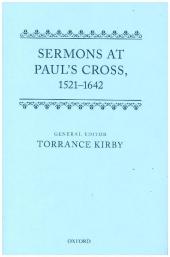 Neuerscheinungen 2017Stand: 2020-02-01 |
Schnellsuche
ISBN/Stichwort/Autor
|
Herderstraße 10
10625 Berlin
Tel.: 030 315 714 16
Fax 030 315 714 14
info@buchspektrum.de |

John N. King, Torrance Kirby, Mary Morrissey, P. G. Stanwood
(Beteiligte)
Sermons at Paulīs Cross, 1521-1642
Herausgegeben von Kirby, Torrance; Stanwood, P. G.; Morrissey, Mary; King, John N.
2017. 592 S. 3 Half-tones. 234 mm
Verlag/Jahr: OXFORD UNIVERSITY PRESS; OUP OXFORD 2017
ISBN: 0-19-872361-X (019872361X)
Neue ISBN: 978-0-19-872361-5 (9780198723615)
Preis und Lieferzeit: Bitte klicken
An anthology of sermons preached at the open-air pulpit situated in the precincts of St Paulīs Cathedral during the sixteenth and seventeenth centuries.
The open-air pulpit in Paulīs Churchyard in the City of London, known as Paulīs Cross, is one of the most important vehicles of popular public persuasion employed by government from the outset of the Henrician Reformation in the early 1530s until the opening salvos of the Civil War when the pulpit was demolished. Paulīs Cross became especially prominent as the public face of government when Thomas Cromwell orchestrated propaganda for the Henrician reformation in the
early 1530s. Here too, after the accession of Edward VI, Hugh Latimer preached his īSermon on the Ploughersī, one of the most celebrated sermons of the English Reformation. While Edmund Bonner, Bishop of London sat here listening to a sermon in 1553, a riot broke out. In November 1559, John Jewel
preached his celebrated īChallenge Sermonī here, arguably the most influential of all sermons delivered at Paulīs Cross throughout the Tudor era. Near the end of Elizabethīs reign William Barlow mounted the pulpit to pronounce the governmentīs response to the abortive rebellion of the Earl of Essex. Barlow preached another sermon at Paulīs Cross in the wake of the Gunpowder Plot in 1605. Throughout the early modern period, Paulīs Cross remained continuously at the epicentre of events which
radically transformed Englandīs religious and political identities. And throughout this transformation, animated as it was by a popular īculture of persuasionī which Paulīs Cross itself came to exemplify, the pulpit contributed enormously to the emergence of a new public arena of discourse. Many of these
sermons preached at Paulīs Cross have been lost; yet a considerable number have survived both in manuscript and in early printed editions. This edition makes available a selection of Paulīs Cross sermons representative of this rich period in the maturation of Englandīs popular culture of persuasion.
Sermons at Paulīs Cross provides welcome attention to the political exercise of preaching in Reformation England. Susan Wabuda, Renaissance Quarterly


